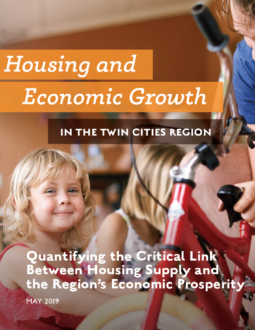Housing and Economic Growth in the Twin Cities: Quantifying the Critical Link Between Housing Supply and the Region’s Economic Prosperity
This research explores the link between housing affordability and the Twin Cities region’s economic prosperity, providing an estimate for the region’s housing need for the next twenty years (2018-2038). The region stands to lose 48,000 jobs and suffer a $4.3 billion loss in Gross Regional Product over the 20-year period if we fail to meet the full housing need.
The Twin Cities region is on a trajectory to become as expensive as cities such as Seattle and Denver, as the region is not producing enough workforce housing to meet the demand of our growing economy. Unless we significantly increase our production of affordable housing, the region will not be able to accommodate new workers and the regional economy will suffer.
At a time when other regions are committing hundreds of millions of dollars in public subsidy to attract private investment and jobs, a much better investment in the region’s economic development is to invest in housing and other infrastructure to support the current economy and to continue to attract new economic activity. No one can solve this problem alone, but we all have a role to play. We hope this report will serve as a wake-up call to us all, as we contemplate and plan for our region’s future.
What are the main takeaways? Read the two-page overview of the report and our press release.
What can Twin Cities workers afford to pay for housing? Working Doesn’t Always Pay for a Home
This report in the media: MPR (May 14, 2019), KARE 11 (May 15, 2019)
